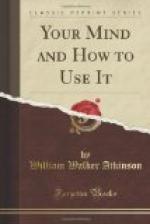Exercise 3. The next time you have a lapse of attention during study, retrace your steps of thought, write down the ideas from the last one in your mind to the one which started the digression. Represent the digression graphically if you can.
Exercise 4. Make a list of the things that most persistently distract your attention during study. What specific steps will you take to eliminate them; to ignore the unavoidable ones?
CHAPTER IX
HOW WE REASON
If you were asked to describe the most embarrassing of your class-room experiences, you would probably cite the occasions when the instructor asks you a series of questions demanding close reasoning. As he pins you down to statement of facts and forces you to draw valid conclusions, you feel in a most perplexed frame of mind. Either you find yourself unable to give reasons, or you entangle yourself in contradictions. In short, you flounder about helplessly and feel as though the bottom of your ship of knowledge has dropped out. And when the ordeal is over and you have made a miserable botch of a recitation which you thought you had been perfectly prepared for, you complain that “if the instructor had followed the book,” or “if he had asked straight questions,” you would have answered every one perfectly, having memorized the lesson “word for word.”
This complaint, so often voiced by students, reveals the fundamental characteristic which distinguishes the mental operation of reasoning from the others we have studied. In reasoning we face a new kind of situation presenting difficulties not encountered in the simpler processes of sensation, memory, and imagery, and when we attempt to substitute these simple processes for reasoning, we fail miserably, for the two kinds of processes are essentially different, and cannot be substituted one for the other.
Broadly speaking, the mental activities of study may be divided into two groups, which, for want of better names, we shall call processes of acquisition and processes of construction. The mental attitude of the first is that of acquirement. “Sometimes our main business seems to be to acquire knowledge; certain matters are placed before us in books or by our teachers, and we are required to master them, to make them part of our stock of knowledge. At other times we are called upon to use the knowledge we already possess in order to attain some end that is set before us.” “In geography, for example, so long as we are merely learning the bare facts of the subject, the size and contours of the different continents, the political divisions, the natural features, we are at the acquisitive stage.” “But when we go on to try to find out the reasons why certain facts that we have learned should be as they are and not otherwise, we pass to the constructive stage. We are working constructively when we seek to discover why it is that great cities are so often found on the banks of rivers, why peninsulas more frequently turn southward than northward.” You readily see that this constructive method of study involves the setting and solving of problems as its distinguishing feature, and that in the solution of these problems we make use of reason.




